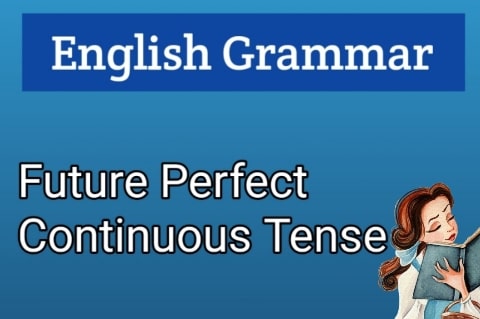Contents
Future Perfect Continuous Tense in Hindi Rules with Examples
- इस Tense के हिन्दी वाक्यों के अंत में रहा होगा, रही होगी, रहे होंगे, रहा हाऊंगा, रही हाऊंगी आदि शब्द आते है । और कार्य के जारी रहने का समय भी दिया रहता है । यहां पर since और for का प्रयोग भी किया जाता है । बात वही है कि Point of Time के लिये Since और Period of Time के लिये for का प्रयोग करते है । Point of Time का आशय निश्चित समय के लिये और Period of Time का तात्पर्य अनिश्चित समय के लिये होता है ।
Future Perfect Continuous Tense Examples-
Leela will have been cooking from the morning.
लीला सुबह से खाना बना रही होगी ।
The players will have been playing since morning.
खिलाड़ी सुबह से खेल रहे होंगे ।
I shall have been suffering from fever for three days.
मुझे तीन दिनों से बुखार आ रहा होगा ।
Future Perfect Continuous Tense Structure
- इस Tense का Structure – Subject + Helping Verb + fourth form of the verb (ving) + Object.
Example –
By the end of this year, we shall have been studying here for three years of LL.B.
इस साल के अंत तक हम यहां तीन साल तक एलएल. बी. का अध्ययन कर रहे होंगे ।
Future Perfect Continuous Tense Helping Verb
- इस Tense की helping verb will have been और shall have been होती है ।
Example –
Ram will have been giving the blessings since next Ram Navmi.
राम अगली राम नवमी तक आर्शीवाद बनाये रख रहे होंगे ।
- Assertive Sentences के प्रथम Part Affirmative जिसका Structure Positive होता है तथा यदि द्वितीय Part Negative हो तो इसमें not आता है ।
Interrogative Sentences बनाने के नियम
- Interrogative Sentences में helping verb – will have been और shall have been में से मात्र will या shall को ही subject के पहले रखा जाता है । जिसका अर्थ “क्या” निकलता है । और ऐसे प्रश्नों के उत्तर देते समय “हां” या “ना” ही पर्याप्त होता है । और Subject के बाद शेष नियम पूर्वानुसार ही होते हैं । यहां पर बात वही है कि यदि Interrogative Sentences WH question words What, Where, When, Which, How से प्रारंभ हो तो इनका अर्थ तो हिन्दी में निकलता ही है इनके बाद जो helping verbs will या shall आएगी वह subjects को देखकर ही लगाना होता है । तत्पश्चात् Subject + have been + ving + Object + …….? आता है ।
Example –
Will you have been dancing since morning ?
क्या सुबह से आप डांस कर रहे होंगे ?
Where will the students have been reading for some time?
विद्यार्थी कुछ समय से कहां पढ़ रहे होंगे ?
Negative Sentences बनाने के नियम
- Negative Sentences में will या shall के बाद not रखते हैं शेष नियम यथावत् रहते हैं । चाहे Sentences Affirmative में हो या Negative में या फिर Interrogative में हो । shall या will को ही subject के अनुसार सहायक क्रिया के रूप में subject के पहले इसलिये रखते हैं क्योंकि यह Future Indefinite Tense या Simple Future Tense से ही चली आ रहे होते हैं ।
Example –
Ram and Shyam will not have been coming to the temple since next Monday.
राम और श्याम अगले सोमवार से मंदिर नहीं आ रहे होंगे ।
The farmers will not have been cultivating before rain.
वर्षा के पहले किसान खेत नहीं जोत पा रहे होंगे ।
- Future Perfect Continuous Tense से ऐसे कार्यों का बोध होता है जो भविष्य में किसी निश्चित समय तक जारी रहेंगे । यह भी सत्य है कि Future में ही शुरू होकर Future में ही चलते रहेंगे । जहां से हम कह रहे हैं , वहां से पहला भविष्य में कोई कार्य शुरू होगा और Future के ही अगले बिन्दुओं तक निरंतर जारी रहेगा । वह कार्य कहां तक समय लेगा यह निश्चित नहीं हो पाता है । शुरूआत तो पता होती है किन्तु कार्य का जारी होना ही अंत को बताता है । इसे बहुत ध्यान से समझना होगा ।
Examples –
Leela will have been cooking from morning.
लीला सुबह से खाना बना रही होगी ।
By the end of this year, we shall have been studying here for three years of LL.B.
इस साल के अंत तक हम यहां तीन साल तक एलएल. बी. का अध्ययन कर रहे होंगे ।
